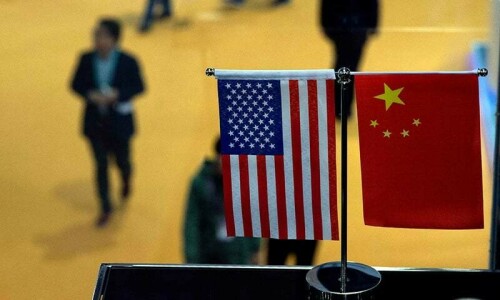WASHINGTON, Feb 3: Pakistan People’s Party Chairperson Benazir Bhutto said here on Saturday a compromise with the military regime was possible only on the basis of holding free and fair elections, and transfer of power to civilian authorities.
Ms Bhutto, on a visit to the United States during which she has met officials at the state and defence departments, may meet with the representatives of the National Security Council.
The chairperson said she had received indications that the US would like the elections promised by Gen Musharraf to be fair. She cautioned Washington against ignoring the fundamental rights of the people of Pakistan.
Mr Musharraf is due to meet President George Bush on Feb 13 at the White House, and Ms Bhutto’s visit at this time has come amid strong US backing for Gen Musharraf after the Sept 11 attacks and the military regime’s policy of support for the US war against terrorism.
The support has raised concerns in opposition circles in Pakistan that the United States might be inclined to sideline the role of political parties, and PPP chairperson’s visit has led to some speculation that she might be seeking to get a political message across to the US about the October elections and terms on which the PPP could work with Gen Musharraf.
A report that she might meet Mr Musharraf during his visit to the US has been denied by Islamabad, and Ms Bhutto is scheduled to leave Washington on Feb 8.
Speaking in strong tones during a meeting with Washington-based Pakistani reporters, Ms Bhutto decried the tendency to personalize praise for Pakistan’s backing of the US. She said tributes should be paid not to Gen Musharraf, but to the people of Pakistan who had backed the military government’s decision to side with America.
The US, PPP leader said, might see Gen Musharraf as a convenient leader who had fallen into the US pattern. But if the US was engaged in a campaign for enduring freedom, then the fundamental rights of the people of Pakistan must be respected. A choice had to be made between democracy and dictatorship, she added.
Peoples Party has endorsed Musharraf’s plans for an increased quota of women’s seats in the next National Assembly and the restoration of joint electorates, but is opposed to the proposed condition that all candidates should be graduates and has reservations on the suggested technocrats’ quota.
Her remarks appeared to indicate that opinion was divided in the PPP on whether to cooperate with the military regime or accept conditions laid down by the government for general elections. Ms Bhutto said she was eligible to contest elections and had every intention of doing so. She described as speculative questions about whether she might be disqualified from being a candidate.
She said hardliners in the military establishment wanted to marginalize political parties and wanted to see a future political set-up in Pakistan that would be headed by a titular leader who could bring in money from abroad, but warned that this would lead to internal anarchy and chaos. She pointed out that a previous military ruler, Ziaul Haq, had also cynically used Afghanistan to consolidate military rule.
The chairperson agreed with questioners that Gen Musharraf’s stand against the forces of extremism in Pakistani society constituted an effort to tackle a long-standing problem, but said there was an apparent disconnect here, in that it was the military and the security apparatus that had patronized extremists, the Taliban and Osama.
It took the massing of half a million Indian troops on the border to make the regime arrest a couple of leaders of militant organizations. A basic reform of the military was necessary, she said.















































